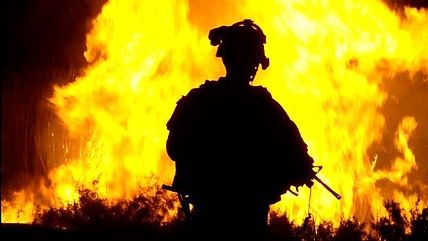How Not to Fight Islamic Terrorism
Overseas attacks haven't worked, and pursuing more of them will only make things worse at home.

In the aftermath of the horrific massacre in Orlando, Presidential candidates Donald Trump and Hillary Clinton both conveyed their condolences to the victims and their families. Though each highlighted different causes of the violent act, both were generally in agreement on one point: the way to keep Americans safe from homegrown radicalization is to continue attacking the Islamic State (ISIS) in the Middle East and elsewhere. If the winner makes good on this promise in 2017, the threat of self-radicalized domestic terrorism will likely continue and possibly even worsen.
Following such a horrific act of violence, it is completely reasonable that political leaders would seek to calm a frightened public. The people need to know that their government is going to solve the problem and keep them safe from future attacks. What's unreasonable, however, is if in an attempt to sound tough and reassuring, leaders advocate policies that would almost certainly worsen the situation.
In speeches following the attack, both candidates told voters what they would do to solve the threat of violent jihadi terror. Clinton believes that the threat could not be contained. "We must defeat it," she said. The current "coalition effort in Syria and Iraq has made recent gains…" and as President she would ramp "up the air campaign, accelerating support for our friends fighting to take and hold ground."
Meanwhile, Trump flatly stated that if he were to be elected as Commander-in-Chief, he would "defeat ISIS overseas."
There is the seductive belief that if only we go "over there" to destroy ISIS, that the threat of homegrown radicalism will be solved. It will not. If we make this attempt with renewed vigor as both candidates are calling for, the result will almost certainly be the increase in the threat of domestic terrorism, not its diminution. It's not hard to understand why.
I have spent considerable time on the ground in Afghanistan and Iraq over a 25-year period in both a military and civilian capacity. I can categorically state that short of a Nazi-like genocidal wiping out of entire populations, it is militarily impossible to go to these overseas locations and destroy the ideology of violent jihadism. Our attempts to do so since 2001 in Afghanistan, 2003 in Iraq, and the numerous places we've used special forces and drone strikes to kill Islamic radicals of various stripes since then has succeeded only in expanding the threat.
Our efforts have been much like trying to put out an oil fire with water. It only makes the flames bigger.
Longtime diplomat and Middle East expert, Chas Freeman, recently explanied that using military power in this way "radicalizes and creates volunteer recruits for our worst enemies. We need to halt this, not double down on it."
Another way not to fight an oil fire is to use an even larger water hose. Former House Speaker Newt Gingrich suggested subjecting the entirety of America's Muslim population to wholesale suspicion, coming close to considering them guilty until they can be proven innocent.
"We're going to ultimately declare a war on Islamic supremacists," Gingrich said, "and we're going to say, if you pledge allegiance to ISIS, you are a traitor and you have lost your citizenship… We originally created the House Un-American Activities Committee to go after Nazis… We're going to presently have to go take the similar steps here."
The Un-American Activities Committee predictably turned into a witch hunt, destroying the lives of hundreds of people who were no threat to the United States. Former President Harry Truman said of the committee it was "the most un-American thing in the country." Moving against the American Muslim population like this would serve to radicalize many far more effectively than the best ISIS propaganda.
You put out an oil fire by suffocating it. As painfully demonstrated by the San Bernardino attacks last December and the Orlando attacks last week, the threat of radicalized, domestic Islamic jihadism is real and growing. Instead of fighting the threat with means that will only spread its flames, we need to change course and deprive it of oxygen instead.
First is to stop the bleeding and suspend policies based on the belief that the United States can impose a set of values and a political system of our preference on others alien to it. Second, we must do all we can diplomatically, politically, and economically to contain the fire of Islamic radicalism to where it currently burns. Working with allies, friends, and even competitors on areas of mutual benefit can help stop the spread by chocking off funds, interdicting resupply chains, and blocking routes by which new radicals join the fight.
Third, we need to stop making far more enemies than we ever eliminate by suspending the use of targeted killing and bombing terrorist targets from the air. This is the most controversial step because it seems counterintuitive to suggest that we can best battle terrorists by ceasing to bomb them. But overwhelming evidence confirms that such tactics are counterproductive and work against our interests.
Instead of bombing, we would use the military to help contain terrorist organizations like ISIS where they currently exist, and then employ new, diplomatic measures that have a chance to undermine the terrorists.
Given the disastrous policies administrations of both parties have employed over the past couple decades, it will take many years of doing things right to bear fruit. What must be avoided at all costs is to exacerbate the current volatile situation by continuing to employ tactics that have routinely failed to attain outcomes beneficial to the United States.
We must resist the temptation to try and put out this violent Islamic oil fire with more counterproductive water-based policies.


Show Comments (267)